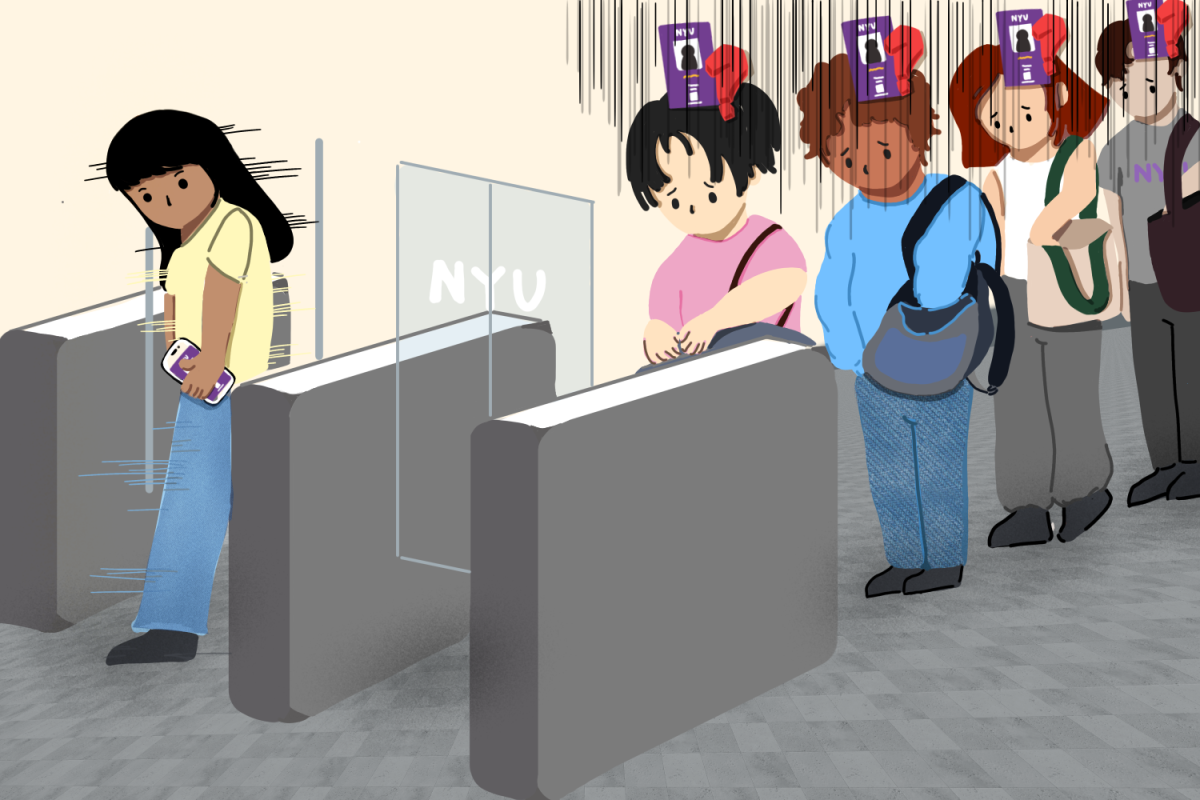Receiving a fresh purple ID on my first day at NYU felt like finally being crowned a Violet. Every moment since then, that flimsy piece of plastic has brought me and my peers substantial vexation. The NYU ID is an essential item for students — it is used to enter buildings on campus, purchase food at the dining halls and markets or even as a room key for dorms like Palladium residence hall. Consequently, during the numerous times I’ve lost or broken my ID, I’ve faced great inconvenience and concerningly inconsistent security protocols. Any one of us could be guilty of losing or breaking our ID, and the hassles — as well as security risks — that come along with having a physical card would be solved altogether by implementing mobile student identification.
The concept of a mobile student ID is not new. The system of having your university ID securely on your phone has already been implemented on at least 100 college campuses in the United States alone. This includes our neighbors at Fordham University, who offer a choice between a physical ID or the “hard to lose” mobile ID through their university mobile app. A solution like this would make perfect sense for NYU, as we are already required to use two-factor authentication through our phones for sites such as NYU Home, event passes, Albert or Brightspace. Integrating a secure ID system — which would need a password or face identification to access — on the NYU Mobile app would be more than feasible.
In fact, NYU already experimented with the mobile ID during the COVID-19 pandemic, when the Violet Go system was used to ensure student vaccination. The pitfall of this technology, though, is that it required labor-intensive scanning and guard checks, as well as a daily sign-in process. With technology like TouchNet that works through Apple Pay, the ID can exist digitally in your mobile wallet and be tapped at checkpoints, making the experience more streamlined. With just a tap of their phone, students can check into their dorm buildings and pay for meals with dining dollars without having to go through a strenuous login process. It can also be easily incorporated into the pre-existing NYU Mobile app.
The disadvantages of the physical university ID we all frantically look for on test mornings and late weekend nights are apparent. First, a physical ID could be easily stolen or borrowed by even a slight doppelganger to breach security checkpoints. Using this logic, someone could easily impersonate the identity of an NYU student and have unrestricted access to our campus, as long as the hair or features are vaguely similar to the years-old ID photo we took when we were 18.
Also, whenever I enter buildings without my physical ID, I experience inconsistent security measures. In one building I was asked to open my Brightspace, in another my Albert and in another I just gave the guard my NYU email. Varied levels of security across buildings undermine NYU’s efforts to curb intruders that threaten the safety of our students.
Campus Safety’s solution for a lost ID is a day pass, which faces the same security weakness as a physical ID. As the NYU Card Center is only open from 8 a.m.-6 p.m. on weekdays, if an unfortunate but inevitable ID loss happens after 6 p.m. on a Friday, your weekend would consist of getting numerous building-specific day passes from campus security, even to simply access a dining hall. To make things worse, the center is a long commute from some NYU dorms or class buildings.
While it would help students if the NYU Card Center had longer and more generous hours, the superior solution would be to do away with physical, plastic IDs altogether and implement mobile identification. By making this push, we can all live in peace and save any last-minute scrambling for quiz review, not hide-and-seek with a card.
WSN’s Opinion section strives to publish ideas worth discussing. The views presented in the Opinion section are solely the views of the writer.
Contact Jack Sloan at [email protected].


























































































































































